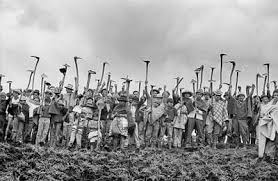#JPSwriteshop . @Peasant_Journal
Moral Economy: it addresses the questions of how peasants react to the break of trust or in the face of the violation of customary practices. Such perception of injustice could lead to a reaction and resistance.
Moral Economy: it addresses the questions of how peasants react to the break of trust or in the face of the violation of customary practices. Such perception of injustice could lead to a reaction and resistance.
E.P. Thompson originally formulated the idea of a moral economy by bringing the notion of perception of injustice derived from material deprivations. https://www.youtube.com/watch?v=eirT8D28bTk&t=17s">https://www.youtube.com/watch...
James Scott wrote the book of Moral Economy of the Peasant, but went beyond scarcities from food markets, for including elements such as the entitlement and access to land, livelihood resources, and reciprocity and redistribution from the powerful in the times of need.
. @MarcEdelmanNYC brings back the idea of Moral Economy, by addressing the crisis of neoliberalism, and its impacts in terms of forced commodification, privatization, deregulation, and worsening of the access to resources.
https://www.jstor.org/stable/3567019 ">https://www.jstor.org/stable/35...
https://www.jstor.org/stable/3567019 ">https://www.jstor.org/stable/35...
Shapan Adnan: "the feelings of injustice among the peasantry have been induced by contemporary conditions", they are addressing targets of resistance beyond the market and the state: supranational governance institutions, and corporations.
Historically, the work of Barrington Moore Jr. and Eric Wolf considered other elements as triggers of peasant resistance:
- Changes in property relations and modes of labor
- Violation of traditional arrangements
- Changes in property relations and modes of labor
- Violation of traditional arrangements
@threadreaderapp please unroll this thread

 Read on Twitter
Read on Twitter




